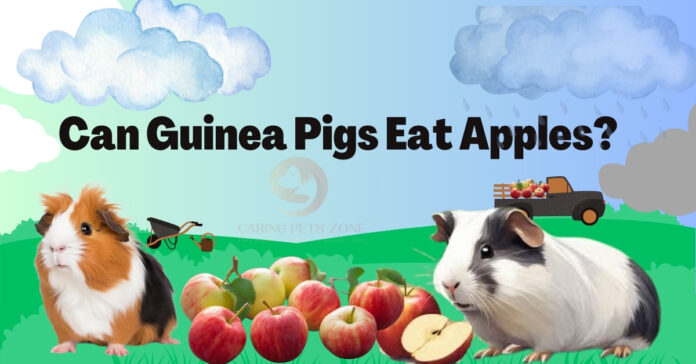When choosing food for your beloved guinea pig, many people ask, Can Guinea Pigs Eat Apples? Yes, they can eat apples, but how to feed them, how much to feed them, and how many times a week should they be fed – these are important to know. What nutrients are in apples? Will it be harmful if they feed too much? Many people get confused in finding answers to many such questions.
Read the entire content carefully to get answers to these questions. Hopefully, you will get the solution to all your problems.
Introduction
Are Apples Good For Guinea Pigs?
Apples are nutritious for guinea pigs, as they contain vitamin C, fiber, and antioxidants. Therefore, they prevent scurvy, improve digestion, and maintain good intestinal health. However, due to the high sugar content of apples, they must be fed in moderation.
While apples are good for guinea pigs, parsley, kale, or romaine lettuce can be more nutritious alternatives. Below is a comparative chart:
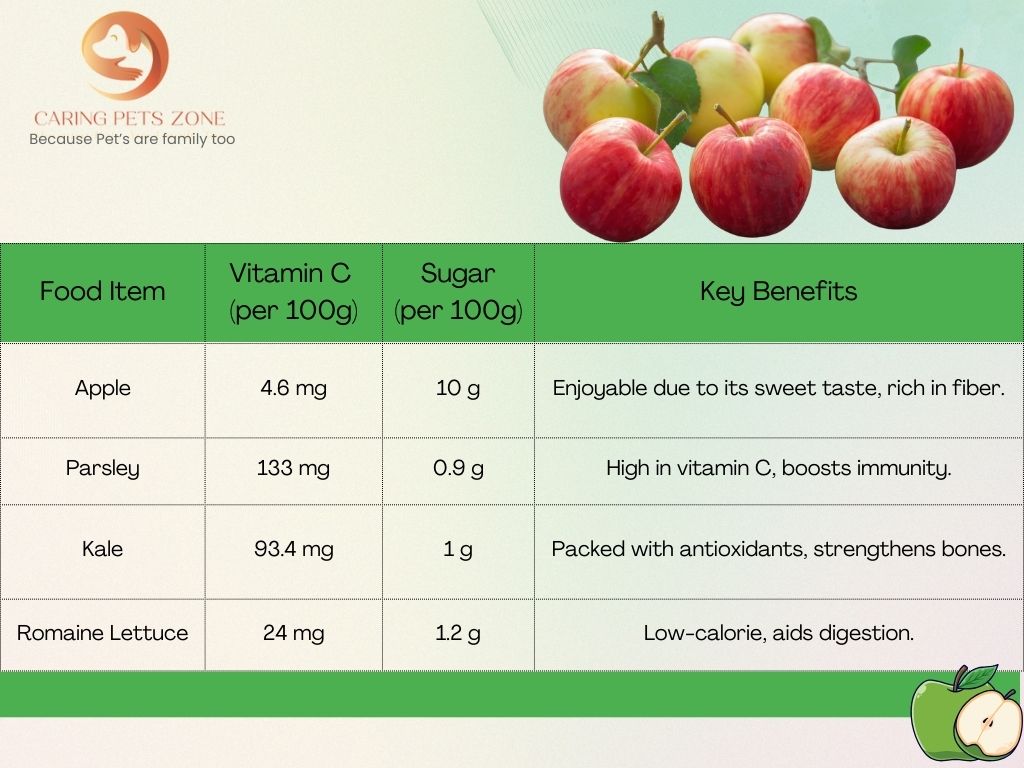
Do Guinea Pigs Like Apples?
Every animal, just like humans, has its own likes and dislikes. Guinea pigs are no exception. A survey found that 80% of guinea pigs like apples because they taste sweet. However, 20% of guinea pigs don’t like apples, perhaps because they are uncomfortable with new foods or because they don’t like the overly sweet taste.
Nutritional Information:
What Vitamins and Other Nutrients Do Apples Contain?
Vitamin C
Vitamin C boosts the immune system of guinea pigs and helps maintain good skin. In addition, it acts as an antioxidant, which protects cells from damage. Regular intake of vitamin C can help prevent scurvy.
Fiber:
Fiber improves the digestive system of guinea pigs and improves intestinal health. In addition, it reduces the risk of constipation and plays an effective role in keeping the intestines clean.
Antioxidants
The antioxidants in apples protect guinea pigs’ cells from damage. They eliminate free radicals in the body, which helps prevent age-related diseases.
Vitamin B Complex:
Apples contain small amounts of vitamins B1 (thiamine), B2 (riboflavin), and B6 (pyridoxine). These vitamins play a role in energy production, nervous system health, and hormone production in guinea pigs.
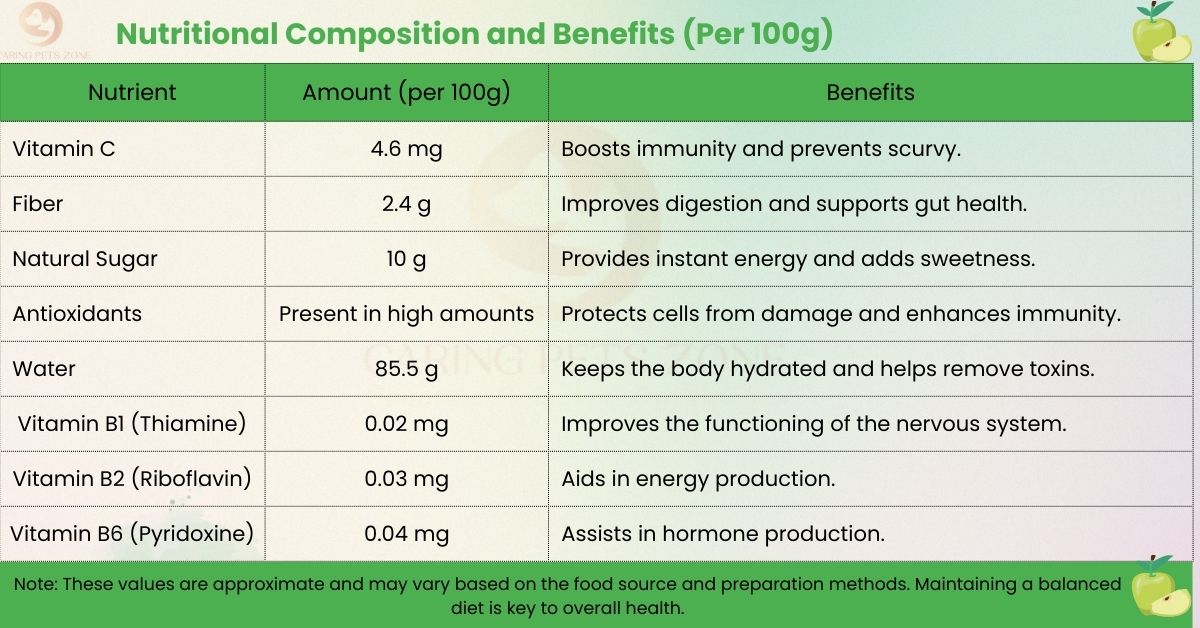
What Are The Disadvantages Of Eating Apples For Guinea Pigs?
Although apples are healthy for guinea pigs, they also have some disadvantages. These are as follows
Excess Sugar:
Eating excess sugar can cause guinea pigs to gain weight and develop various diseases. Such as dental problems, diabetes, diarrhea or digestive problems, etc.
Seed Problems:
The seeds must be removed before feeding apples. This is because apple seeds contain cyanide, which can be toxic to guinea pigs.
Gastric Problems:
Apples contain fructose (a type of sugar) and fiber, which not all guinea pigs can digest. So they accumulate in the stomach and turn into gas, which can cause flatulence and diarrhea.
Not all guinea pigs have this problem. Some guinea pigs do. If this happens, they should stop eating them.
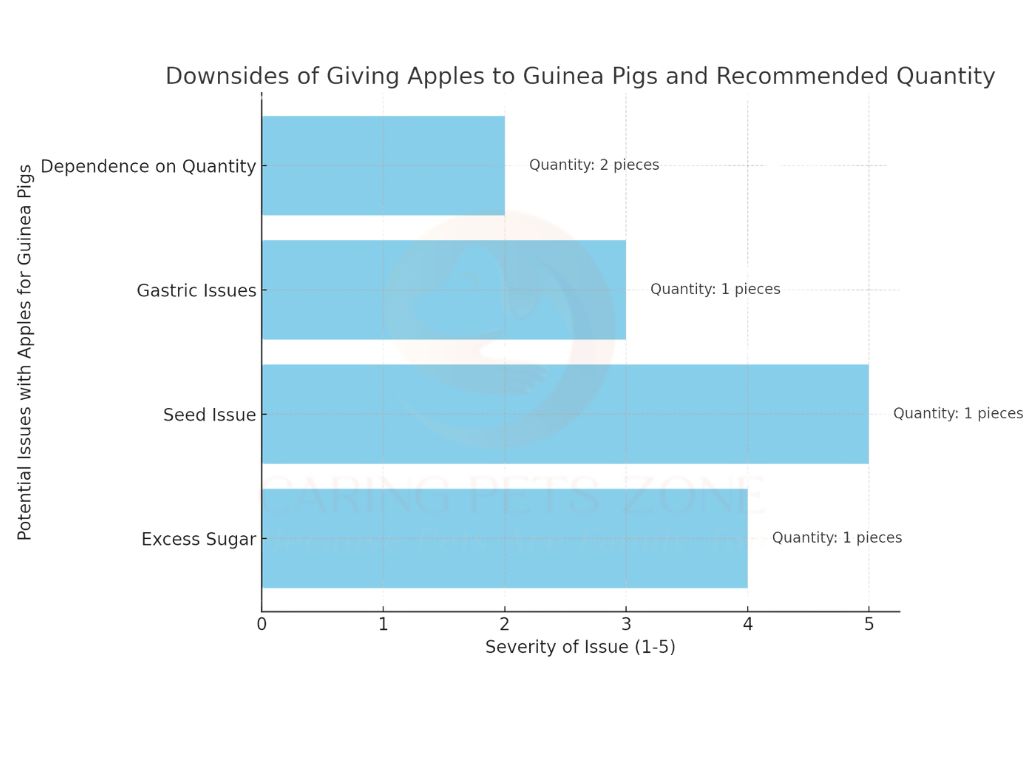
Types Of Apples And Their Suitability
Types of Apples for Guinea Pigs
There are many different types of apples, some of the most notable of which are:
- Granny Smith apple
- Fuji apple
- Gala apple
- Red Delicious apple
- Green apple
- Red apple
Can Guinea Pigs Eat Green And Red Apples?
Yes, guinea pigs can eat green and red apples. Green apples are sour and crunchy, which is good for their health, and red apples are usually sweet. Although they usually like to eat both apples, for some guinea pigs this may be an option. Therefore, you should be careful with the amount of apples you feed them.
Which Type Of Apple Is Best For Guinea Pigs?
Granny Smith apples are the best for guinea pigs. Because they are tart and crunchy, they are good for their teeth and health. However, Fuji or Gala apples can also be given in small amounts occasionally
Can Guinea Pigs Eat Apple Peels?
Yes, guinea pigs can eat apple peels. Apple peels contain most of the fiber and potassium, which are good for their health. However, some guinea pigs prefer to eat the apple peel, which deprives them of those nutrients. It is very important to wash the peels thoroughly before feeding them, as they may contain pesticide residue.
Can Guinea Pigs Eat The Core Of An Apple?
Yes, they can, but in my opinion, they shouldn’t be fed because The core of an apple contains seeds, which can release a toxic substance called cyanide. This can be harmful to their health. So, always discard the core and seeds properly when feeding apples.
Serving Apples to Guinea Pigs
How To Safely Feed Your Guinea Pig Apples
Before feeding apples, remove the seeds and cores, as they can be toxic. Cut fresh, clean apples into small pieces that are easy for your guinea pig to eat.
Fresh apples should be fed, as cooking or canning reduces their nutritional value. Homemade applesauce can be fed, but do not add extra sugar or spices.
Avoid feeding dried or frozen apples, as they are low in nutrients and pose a choking hazard. Finally, limit the amount of apples your guinea pig is given to ensure their health.
How Often Can Guinea pigs Eat Apples?
Guinea pigs can eat apples 1-2 times a week. Apples are high in natural sugar, so they should not be fed regularly. Feeding too many apples can cause gas or diarrhea in guinea pigs. So, be careful with the amount before feeding apples and always give fresh apples.
Apple Feeding Chart For Guinea Pigs

Should Guinea Pigs Be Fed Apples On An Empty Stomach Or a Full Stomach?
Guinea pigs should definitely be fed apples on a full stomach, as the natural sugar in apples can cause digestive problems and gas on an empty stomach. However, feeding apples on a full stomach makes them easier to digest and keeps them comfortable. So feed them hay or pellets before giving them apples. If you follow this rule, your guinea pigs will be healthy.
What To Mix With Apples For a Balanced Guinea Pig Diet?
To make a balanced treat for guinea pigs, mix apples with hay or fresh vegetables such as carrots, cucumbers, or spinach. This way, you can ensure their nutrition and add variety to their diet. This treat will be healthy and tasty for guinea pigs.
Special Scenarios
Can Baby Guinea Pigs Eat Apples?
Yes, baby guinea pigs can eat apples, but first let them get used to eating their staple food, such as hay, pellets, or nutritious vegetables like spinach, broccoli, or carrots. Next, offer them a small piece of apple, making sure to remove the seeds. Gradually accustom them to the taste of apples and watch for any digestive issues. This will make it safer and healthier for them to introduce them gradually.
Can Guinea Pigs Eat Apples During Pregnancy?
Yes, guinea pigs can eat apples during pregnancy, but they should be given in moderation. Guinea pigs’ bodies cannot produce vitamin C on their own, and during pregnancy they need vitamin C, which apples provide directly. The vitamin C and fiber in apples help meet the nutritional needs of pregnant guinea pigs.
Can Guinea Pigs Be Allergic To Apples?
Guinea pigs can be allergic to apples, but this is very rare. If you notice any redness, itching, or unusual behavior after feeding apples, stop giving them apples immediately. Feeding a small amount of apples first will help determine their reaction. If you have any concerns, consult your veterinarian.
What Should You Do If Your Guinea Pig Overeats Apple?
If your guinea pig eats too much apple, remove it immediately. Excess sugar can cause digestive problems. So monitor their health closely. Give them plenty of hay, as it helps with digestion. If diarrhea or any other problem occurs, seek veterinary help immediately.
Variations of Apple and Related Items
Fresh vs. Processed Apple
Fresh apples are very beneficial for our guinea pigs only. Because fresh fruits are full of nutrients. They have all kinds of qualities. On the other hand, processed apples contain extra sugar and chemicals which are harmful to themselves and other animals. Eat fresh fruits, stay healthy and keep your pets healthy.
Can Guinea Pigs Eat Applesauce?
Applesauce is a sauce made from apples, usually cooked or blended with apples. Applesauce is thick and pasty. It is made with sugar and preservatives, which are not suitable for guinea pigs. If you want to give them an apple flavor, just give them small pieces of fresh apple.
Can Guinea Pigs Eat Applesauce?
Regular dried apples are not safe for guinea pigs, as they contain added sugar and preservatives. However, Kaytee Natural Snack is formulated to be safe and nutritious for pets. It provides essential nutrients for your pet while keeping harmful ingredients out of the way.
Feeding Chart for Guinea Pigs: Kaytee Natural Snack
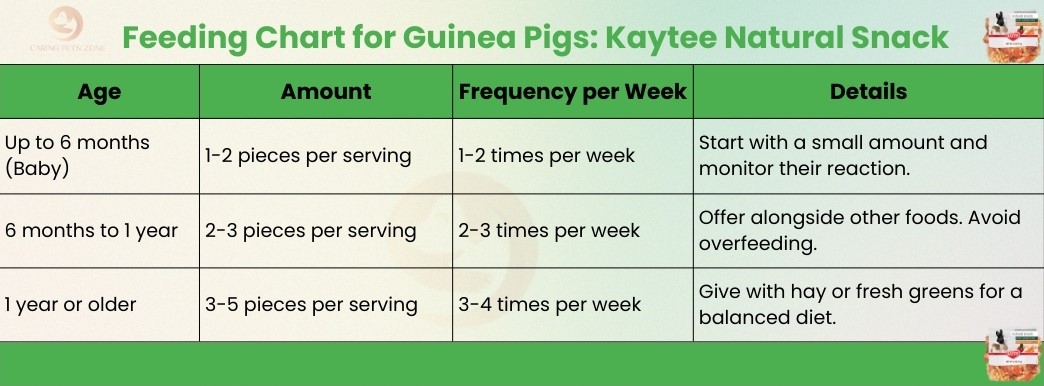
Can Guinea Pigs Eat Apple Tree Leaves?
Yes, guinea pigs can eat apple tree leaves. But make sure that the tree has not been treated with pesticides or harmful chemicals. If in doubt, wash it thoroughly before feeding it. Unlike apples, leaves do not contain sugar, so they are safe for guinea pigs and may be more nutritious than apples.
What Are The Signs Of Overfeeding Apple to Guinea Pigs?
- Diarrhea or constipation may occur.
- Excessive thirst.
- Weight gain is possible.
- Abnormal behavior may occur.
- Bad breath may occur.
What Other Foods Can Guinea pigs Eat?
Guinea pigs mainly eat fresh hay, green vegetables, and fresh fruits. Hay should be their main food because it is very important for digestion. Among vegetables, kale, spinach, romaine lettuce, etc. are safe and nutritious. They can also eat Grapes, Watermelon, Pineapple, Strawberries, Cilantro, and Papaya.
Conclusion
In view of the above discussion, it can be said that apples are nutritious food for guinea pigs, but it is very important to feed them according to the correct rules. As the saying goes, nothing in excess is good. So, refrain from overfeeding. To ensure their health and happiness, bring variety in the diet. Again, I say, pay special attention to the quantity. Thank you.
FAQ:
Do Apples Cause Sore Mouths in Guinea Pigs?
No, apples do not usually cause sore mouths in guinea pigs.
Can Guinea Pigs Eat Apple Sticks?
Yes, guinea pigs can eat dried apple sticks, but they must be chemical-free. Plus, the sticks are good for their teeth.
How to Store Apples for Guinea Pigs?
Store apples in the refrigerator and wash them thoroughly before eating.


